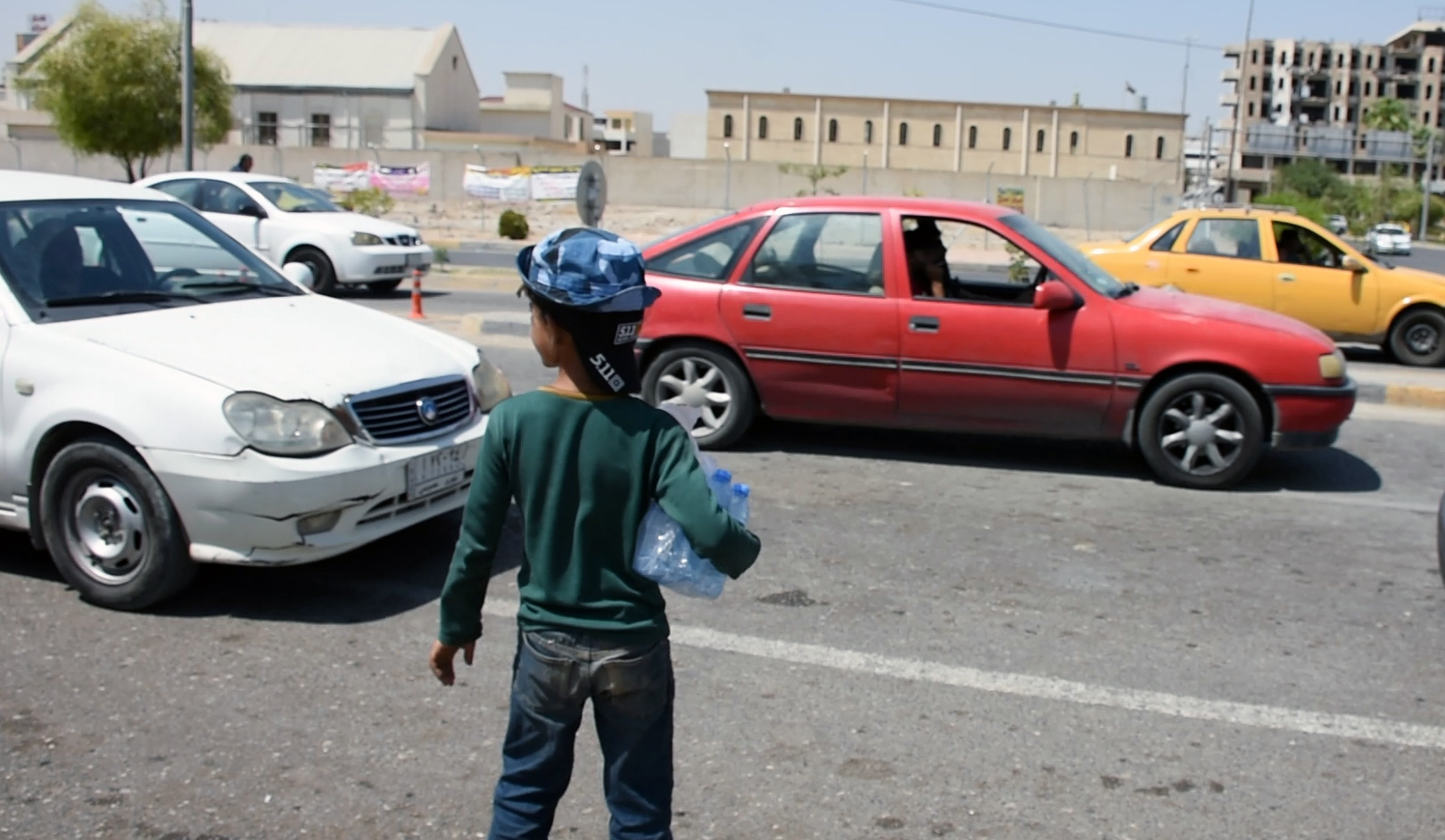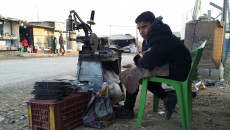Large numbers of Mosul children leave school and go to work in order to help their families confront poverty.
Safwan, one of the children who dropped out of school, sells ladies’ socks in a crowded bazaar on the west side of the war-torn Mosul from early morning until evening and earns five to six thousand Iraqi dinars ($4) a day from his work.
“Due to the deteriorating living situation of my family, I had to leave school,” said Safwan Ahmed, 14, since his father is elderly and unable to work, so he must help to secure a living.
Safwan left school when he was in the fifth grade of primary school, he told KirkukNow. His family does not have a state monthly salary and the government does not provide them with assistance, so he chose to work instead of education.
The dropout rate in Nineveh Governorate varies according to educational levels, from 20 up 76%, according to official statistics obtained by the KirkukNow.
This comes while the provisions of the Universal Convention on the Rights of the Child stipulate that every child has the right to education and a decent life, and children have the right to be protected from doing dangerous work or a duty that prevents them from obtaining education or harms their health or development.
Nofal Suleiman, Director of Statistics in Nineveh Governorate, told KirkukNow the enrollment rate in the primary stage is 80%, but this percentage decreases in the intermediate stage to 60% and reaches 24% in the preparatory (High school).”
He explained that one of the main reasons for dropping out of school is failure, followed by the deterioration of the living conditions of Nineveh residents, which forces children to contribute to securing a living for their families, and there is no appropriate environment that encourages children to return to school.
In Nineveh Governorate, which has a population of more than 4.1 million, the number of primary school students was 614,000 and secondary school students 225,000, according to statistics from the Central Bureau of Statistics for the academic year (2019-2020).
7% of Nineveh’s children work in a dangerous environment
“7% of Nineveh’s children work in a dangerous environment, and this includes 74,000 children between the ages of five to 17 years,” says Nineveh Statistics Director, adding this percentage is large compared to other countries since 27% of Nineveh’s population is between the ages of 5 to 13 years.
Under the Iraqi Labor Law, it is not permissible to employ minors of both sexes before completing the age of 15, and violating this law entails penalties. For those who have completed this age, the work they do may not be burdensome and dangerous and it must not negatively affect his behavior or studies.
Violation of this law is clearly visible in the bazaars of Mosul, where dozens of children under the age of fifteen work in various jobs, some of whom sell water bottles or plastic bags, and some of whom work in stores, without having older members of their families or relatives with them.
Video: Safwan quit school and sells socks in Mosul to make living of his family. October 2023, KirkukNow
Ali Jassim, director of the Popular Relief Organization in Nineveh, told (KirkukNow) that children going to work in Nineveh has become a common issue due to the circumstances that the region has gone through, most notably the war against the “Islamic State of Iraq and the Levant” ISIL, which forced many families to put their children to work due to the loss of their sources of livelihood.
“The presence of children at traffic intersections and streets under the pretext of selling water bottles or paper tissues is a dangerous phenomenon and a problem that threatens societal security,” Jassim believes.
“The numbers of these children are increasing without any oversight, while probably other people might be standing behind the phenomenon of child labor.” Jassim suggested that the security authorities should be more vigilant and investigate of the matter.
More than three million Iraqi school-age children are not enrolled in school, according to UNICEF statistics, which believe that the conflicts that the region has witnessed over the past years have cast a shadow on the educational reality and caused an increase in the dropout rate due to deteriorating living conditions and displacement.
Iraq has witnessed a sharp increase in national poverty rate from 20% in 2018 up to 31.7% in 2021and the total number of poor to 11.4 million as a socio-economic impact of the Covid-19 pandemic, shows an assessment by the Iraqi Ministry of Planning with the support of UNICEF, World Bank, and Oxford Poverty and Human Development Initiative.
The unemployment rate in Nineveh is 32%, which is the highest rate compared to other governorates of Iraq
The director of Nineveh Statistics said the poverty rate was 38%, according to statistics dating back to 2019, and it is the same now. “Rather, it has increased due to the deterioration of the living conditions of citizens and the lack of economic projects that play a role in raising the standard of living."
The unemployment rate in Nineveh is 32%, which is the highest rate compared to other governorates of Iraq, according to Nofal Suleiman.
The percentage of working children in Iraq between the ages of 6 to 14 is 2.7%, according to estimates by the Central Bureau of Statistics for 2016.
The International Labor Organization ILO said in June 2022 that unemployment rate in Iraq has jumped from 9% early 1990s into 14.2% in 2021.
Out of 40 million Iraqis, 9.2 million are employed while Iraq's state-dominated economy is led by the oil sector, which provides approximately 85% of state revenue. The government pays 400% more in salaries than it did 15 years ago. Around three quarters of the state’s expenditures in 2020 went to paying civil servants of the public sector.
The official of the Popular Relief Organization, which is concerned with public rights, says that the organization’s programs include supporting children’s rights and educational centers to create educational opportunities and return to schools.
According to the instructions and controls of the Iraqi Ministry of Education, if a student stops studying for two years, he must attend an evening school. However, if he stops studying for four years, he will not be allowed to attend morning or evening schools either, and he must then enroll in accelerated education schools.
Iraq has an accelerated education system for people who have dropped out of school for various reasons, and in Mosul there are 3-4 similar schools that opened several years ago.
Safwan has not lost his passion for studying and learning, but he will be forced to enroll in evening school because he stopped studying three years ago, and this matter depends on the improvement of his family’s living situation.






